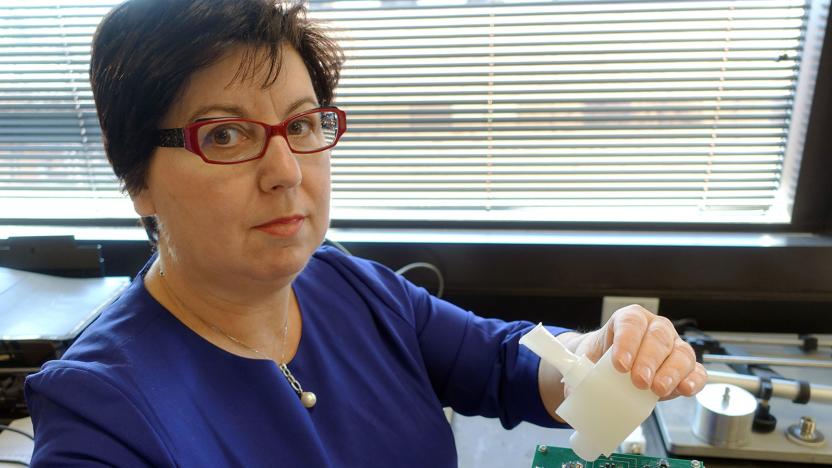uta
Latest

A breath monitor could soon be used to detect the flu
What if you could pick up a device from the drug store that could tell you if you have the flu and save you a trip to the doctor? That's one possibility for a breath-analyzing gadget that University of Texas at Arlington professor Perena Gouma has developed. The device is similar to the breathalyzers law enforcement use to determine if you've had too much to drink. The difference is that it employs low-cost sensors to analyze a person's breath and isolate biomarkers that can indicate whether or not you have the flu.

Gaming gets immersive thanks to union of pico projector and eye tracking camera (video)
Although in the earliest stages of development, this virtual reality gaming rig already looks pretty intriguing. Engineered by clever kids at the University of Texas at Austin, it hot-wires an eye tracking camera to a motorised pico projector with the result that the player literally can't take their eyes off the screen. Wherever they look, that is where their view of the gaming world is projected. The rig makes most sense in a first-person shooter, although the students have also tried it in a flight simulator where the player uses their head to roll and pitch the aircraft. Yes, it looks rather similar to the Microvision PicoP laser projection gun we wielded at CES, but there's a key difference: the player does not need to hold anything or have anything attached to their body. This unencumbered Kinect-esque approach could potentially allow a greater sense of freedom -- except that, for it to work, the player is forced to sit directly in front of the eye tracker. Find a way to fix this, dear Longhorns, and you could be onto something. Video after the break.

Google funds project to teach computers regret, sadly won't lead to apologetic machines
We've seen a rather creepy array of robots programmed to mimic human emotions, but teaching a machine to feel regret? Now, that's a new one. With funding from Google, a team of Tel Aviv University researchers is working on an algorithm to teach computers to learn from their experiences, thus reducing instances of "virtual regret." According to the team's lead, such an algorithm would allow servers and routing systems to more efficiently deal with internet traffic, by recognizing and documenting things like sudden spikes in traffic or increased attention to an online product. Basically, the more they learn from their past inadequacies, the more effectual the machines become. Google's apparently interested in the potential impact on programs like AdSense and AdWords. Now, if they could just teach online advertisers a sense of shame... Full PR after the break.

Researchers advance remote monitoring systems for the elderly
Assistive technologies are old hat, but a team of researchers at the University of Texas at Arlington (among other institutions) is working to provide a more robust, all-inclusive option for elderly individuals who'd prefer to age gracefully within their own domiciles. In theory, sensors could be embedded throughout seniors' homes in order to "detect when the residents have sleepless nights or forget to take their medication." From there, caregivers would be alerted and could react remotely via a web-based communications portal. The UTA lab that's perfecting the idea currently utilizes a single room equipped with cameras, motion detectors and robots, and professors / students keep a close eye on any movement that gets recorded and transferring to computers for processing. If all goes well, a collaboratively built "home of the future" will actually be on display at CES 2009, likely showcasing some of these very advancements.[Image courtesy of Michael Mulvey / DMN, thanks Travis]

EA inks talent agency deal, more game movies coming
In a season of Hollywood blockbusters, it's no wonder why Electronic Arts would want to sink its teeth into the movie industry's delicious celluloid pie. This morning the company announced that it signed with talent and literary agency, UTA, to help catapult its properties onto the silver screen. EA currently has a movie deal in the works for The Sims, as well as plans to bring an animated version of MySims to TV. In addition, earlier this year EA signed a deal with Starz Media to develop an animated prequel to Dead Space, as well as other unspecified franchises. But that's just the tip of the iceberg, as EA notes that this new deal will "significantly ramp up" efforts to bring its IP to other forms of entertainment, such as movies and television, as well as online, print, and social networks. With some of these projects likely to surface this week in San Diego during Comic-Con, are there any EA properties you could see yourself sitting through with a bucket of popcorn in your lap?



